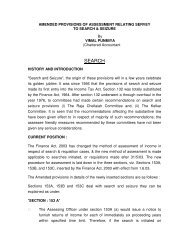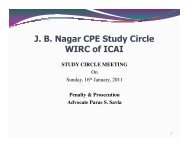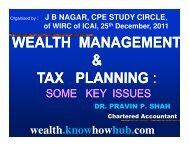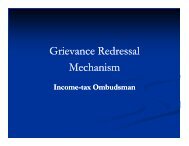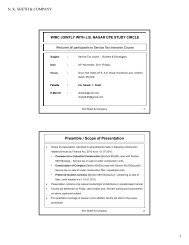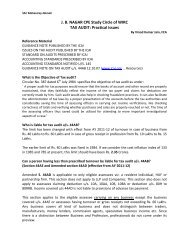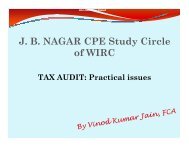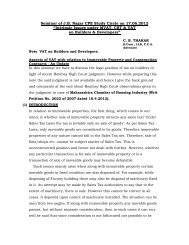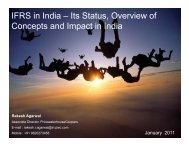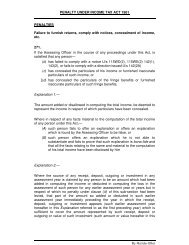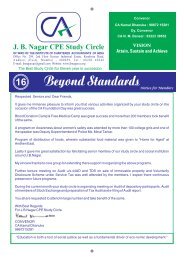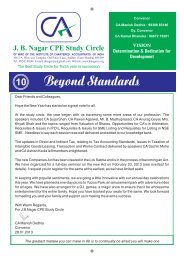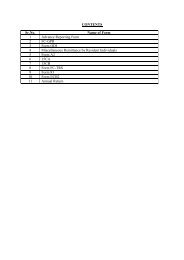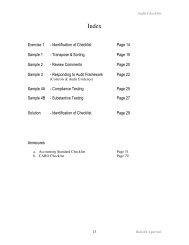Income from Employment, House Property and Other Sources ...
Income from Employment, House Property and Other Sources ...
Income from Employment, House Property and Other Sources ...
- No tags were found...
Create successful ePaper yourself
Turn your PDF publications into a flip-book with our unique Google optimized e-Paper software.
Intensive Study Course on <strong>Income</strong> Tax<strong>Income</strong> <strong>from</strong> <strong>Employment</strong>,<strong>House</strong> <strong>Property</strong> <strong>and</strong> <strong>Other</strong><strong>Sources</strong>, Expenditure relating toincome not includible in Total<strong>Income</strong> <strong>and</strong> Section 94CA Rajesh S. Athavale14 June 2011
Contents<strong>Income</strong> <strong>from</strong> <strong>Employment</strong><strong>Income</strong> <strong>from</strong> <strong>House</strong> <strong>Property</strong><strong>Income</strong> <strong>from</strong> <strong>Other</strong> <strong>Sources</strong>Expenditure relating to income not includible in Total <strong>Income</strong>Section 942
<strong>Income</strong> <strong>from</strong> <strong>Employment</strong>3
Scope of <strong>Income</strong> <strong>from</strong> Salary – Section 15Salary due <strong>from</strong> a current/former employer , whether paid to not Salary is taxable on due/accrual basis – Bhuban v. CIT (29 ITR229) Contribution made by employer to social security fund – Vestedinterest in the contribution - CIT v. Russel (53 ITR 91)(SC)/JCIT v.Pramod Bhasin (8 SOT 72)(Del)Advance Salary paid/ allowed Perquisites allowed – CIT v. Russel (53 ITR 91)(SC)Arrears of salary paid/allowed, if not charged in earlier years CIT v. Sardar Arjun Singh (240 ITR 693)(SC)Remuneration (salary, bonus, commission) paidto a partner of a firm is not a salary4
Section 15Relationship of Employer <strong>and</strong> Employee Right of Control or Supervision Ram Prashad v. CIT (86 ITR 122)(SC) Piyare lal Adishwar Lal v. CIT (40 ITR 17)(SC) Contract of Service (Sec 192) v. Contract for Service (Sec. 194J)– CIT v. Appollo Hospitals International Ltd.(2011-TIOL-59-ITAT-AHM)(Ahd)<strong>Income</strong> <strong>from</strong> an office not amounting to employment is taxableas ‘<strong>Income</strong> <strong>from</strong> other sources’ or ‘Business <strong>Income</strong>’Director of the Company Ram Prashad v. CIT (86 ITR 122)(SC) CIT v. Smt. Shanti Devi (199 ITR 800)(Ori)5
Section 15Performance of duties to promote the businesscommission/incentivebonus CIT v. M.D. Patil (229 ITR 71)(Kar) No separate deduction <strong>from</strong> incentives – CIT v. E.A. Rajendran(142 CTR 244)(Mad)Receipts <strong>from</strong> Persons other than EmployerTax paid by an Indian company on the salary of employees of aforeign collaborator – <strong>Income</strong> <strong>from</strong> <strong>Other</strong> <strong>Sources</strong> Emil Webber v. CIT (200 ITR 483)(SC)6
Section 15Voluntary <strong>and</strong> Contractual Payments - TaxableTestimonials <strong>and</strong> Personal Gifts – Not TaxableA lump sum paid in commutation, reduction or substitution ofsalary, pension or other profits of employment – taxableExemption to commutation of pension – Section 10(10A)Tax- free Salary Taxable aggregate of net salary <strong>and</strong> tax paid by employer –Takenaka v. CIT (237 ITR 112) Tax borne by employer voluntary/contractual obligation - Taxable7
Section 15Voluntary Forgoing – Application of <strong>Income</strong> Taxable – Raghunathan v. CIT (231 ITR 826) Foregone before due – Non taxable – CIT v. Jain (167 ITR161)(SC) Subsequent waiver – Deduction to be given – Real <strong>Income</strong> theory- CIT v. Bachubhai Shah (104 ITR 551)(Guj) Accommodation provided by employer, perquisites must be valuedeven if it is not used by employee – CIT v. Bawa Singh Chauhan(150 ITR 8)(Del)8
Section 16Entertainment Allowance – Government Employees to theextent of 1/5 th of Salary or INR 5,000, whichever is lowerTax on <strong>Employment</strong> – Profession Tax Contribution to Health Scheme not deductible – CIT v. Dr. K.L.Parekh (208 ITR 965)(Raj)9
Section 17Salary includes advance/leave salary Annuity or pension Perquisites Gratuity Profit in lieu of salary Annual accretion or contribution to PF beyond non-taxableBenefits arising <strong>from</strong> employment, some of them In the nature of income Convertible into money Non-convertible into money10
Section 17Salary in lieu of notice Taxable – IEL v. CIT (204 ITR 386)Annuity <strong>and</strong> Pension Received <strong>from</strong> employer – Taxable as Salary- Daniel v. CIT (248ITR 174) Received <strong>from</strong> a person other than employer, like LIC – Taxableas <strong>Income</strong> <strong>from</strong> other sourcesGratuity First Taxable <strong>and</strong> then Exempt u/s. 10(10)11
PerquisitesPerquisites Personal advantage Rent-free accommodation Telephone/mobile Motor car Helper, attendance Club Concessional loan, etc.Rule 3 – Valuation of perquisites – m<strong>and</strong>atory Sundaram v. CIT (251 ITR 781)(SC)12
PerquisitesCCA, HRA <strong>and</strong> DA – Part <strong>and</strong> Parcel of Salary Taxable – Karamchari Union v UOI (243 ITR 143)(SC)Scholarship granted to children of employees Not taxable – CIT v. M. N. Nadkarni (161 ITR 544)(Bom)Any payment by employer in discharge of any obligation ofemployee – Taxable Life, medical or personal accident insurance policy – Not taxableas for the purpose of benefit to employerDeferred annuity policy Not taxable as not vested interest – not due – CIT v. Vas (240 ITR101) Taxable if purchase out of money due on account of commissionor salary – CIT v. Navnit Lal (247 ITR 70)(SC)13
PerquisitesMedical Facilities Not taxable – hospital maintained by employer or approvedhospitals or approved diseases Not taxable - Reimbursement of actual expenditure incurred uptoINR 15,000 Not taxable – Medical treatment outside India, subject to certainconditionsStock options Taxable on exercise w.e.f AY 2000-01 – CIT v. InfosysTechnologies Ltd. (297 ITR 167)(SC) Stock Appreciation rights – Taxable - deferred cash compensationcontingent upon financial performance of the company – forrendering of services to the company - Sumit Bhattacharya v.ACIT (300 ITR 347)(Mum)(SB)14
Perquisites Transport facilities to employees <strong>from</strong> home- to office <strong>and</strong> back – Nota perquisites – Section 17(2)(iii) – Transworks Information ServicesLtd. v. ITO (2009-TIOL-568-ITAT-MUM)(Mum)/WNS Global Servicesv. ITO (2009-TIOL-568-ITAT-MUM)(Mum)Any special allowance specifically granted to meet expenseswholly, necessarily <strong>and</strong> exclusively incurred for the purpose ofthe duties of office or employment – Exempt u/s. 10(14) , to theextent such expenses are actually incurred for that purpose –CIT v. Goslino Mario (241 ITR 312)(SC)/CIT v. S.G. Pgnatale(124 ITR 391)Interest-free loans Taxable Interest-Free Security Deposit – Not taxable CIT v. Vijay Singh(323 ITR 446)(Del) /Sankar Krishnan (Mum)15
PerquisitesContribution to superannuation fund, if it exceeds INR 1 lakhConcessional Meal Free food <strong>and</strong> non-alcoholic beverages provided during workinghours at office or business premises or through paid voucherswhich are not transferable <strong>and</strong> usable only at eating joints, to theextent the value thereof either case does not exceed INR 50 permeal or to tea or snacks provided during working hours or to freefood <strong>and</strong> non-alcoholic beverages during working hours providedin a remote area or an off-shore installationGift, Voucher upto INR 5,000 per year – Not Taxable16
Profit in lieu of SalaryProfit in lieu of salary Compensation for loss of employment Taxable – Arunachalam v. CIT (241 ITR 287)Keyman insurance policyVoluntary retirement – <strong>Income</strong>, though paid in instalments, to beaccrued in the initial year Y.S.C. Babu v. Syndicate Bank (253 ITR 1)(AP)Non-compete fees/Ex-gratia <strong>and</strong> voluntary payment afterretirement – Taxable Prior to AY 2002-03 – Not Taxable - CIT v. Deepak Verma (2010-TIOL-679-HC-DEL-IT)(Del)/ B.K.Kotru v. CIT( 282 ITR1)(Bom)/CIT v. A.K. Khosla (2010-TIOL-321-HC-MAD-IT)(Mad)Sign-on-bonus - Taxable17
Keyman Insurance PolicyIn the h<strong>and</strong>s of employer Premium is deductible as business expenditure Receipt of surrender value/maturity proceeds - TaxableIn the h<strong>and</strong>s of employee Payment of premium – Not a perquisite Receipt of maturity – Taxable as “Profits in lieu of Salary”/<strong>Income</strong><strong>from</strong> <strong>Other</strong> <strong>Sources</strong>In the case of assignment Receipt of Surrender value <strong>from</strong> employee – Taxable in the h<strong>and</strong>sof employer as ‘Business <strong>Income</strong>” Receipt of maturity proceeds – Taxable in the h<strong>and</strong>s of employeeas “Profits in lieu of Salary”/<strong>Income</strong> <strong>from</strong> <strong>Other</strong> sourcesExemption u/s. 10(10D) – Not available to Keyman Insurance– Rajan N<strong>and</strong>a (2010-TIOL-674-ITAT-DEL)(Del)18
Comparative Framework – ITA v. DTC<strong>Income</strong> tax ActSalaries (Section 15)Deduction <strong>from</strong> Salaries (Section 16)Direct Taxes Code<strong>Income</strong> <strong>from</strong> <strong>Employment</strong> (Clause20)Computation of <strong>Income</strong> <strong>from</strong><strong>Employment</strong> (Clause 21)Salary, Perquisites <strong>and</strong> Profits in lieuof salary defined (Section 17)Scope of Gross Salary (Clause 22)Deduction <strong>from</strong> Gross Salary(Clause 23)19
Gross Salary – Clause 22 of DTCThe gross salary shall be the amount of salary due, paid, orallowed, whichever is earlier, to a person in the financial year byor on behalf of his employer or former employerClause 314(88) – Definition of “employer” means a person whocontrols an individual under an express or implied contract ofemployment <strong>and</strong> is obliged to compensate him by way of salary20
Salary under DTCClause 314 (223) “salary” includes,— (New items)(b) remuneration;(f) any allowance or benefit granted to an employee—(i) to meet his personal expenses at the place where the duties of hisoffice or employment of profit are ordinarily performed by him orwhere he ordinarily resides;(ii) to compensate him for the increased cost of living;(iii) to meet expenses wholly, necessarily <strong>and</strong> exclusively for theperformance of the duties of an office or employment of profit;(iv) to remunerate or compensate him for performing duties of a specialnature relating to his office or employment of profit; or(v) which is in the nature of house rent allowance;21
Perquisites <strong>and</strong> Profits in lieu of salaryClause 314(191) “perquisite” means,— the amenity, facility,privilege or service, whether convertible into money or not,provided directly or indirectly to an employee by the employer,whether by way of reimbursement or otherwise, being—Clause 314 (254) “sweat equity share” means—(a) any security underlying any employees stock option grantedunder any plan, or scheme, of the employer; or(b) any security issued by a company to its employee or director, ata discount or for consideration other than cash; Value of obligation will be prescribedClause 314 (202)“profits in lieu of or in addition to any salary”includes compensation at the time of voluntary retirement22
Perquisites <strong>and</strong> Profits in lieu of salaryValue of any accommodation will be prescribed – “Rent-freeaccommodation”, “value of concession in the matter of rent” ???Sweat Equity at free of cost or at concessionalrate/computation???Sweat Equity for providing know-how or making available rightsin the nature of intellectual property rights or value additions23
Deduction <strong>from</strong> Gross Salary – Clause 23Profession tax [Section 16(ii) of the Act]Conveyance allowance/benefit for journey between residence<strong>and</strong> office may be prescribed [Section 10(14) of the Act]Any allowance or benefit- to meet expenses wholly, necessarily <strong>and</strong> exclusively in theperformance of the duties may be prescribed, to the extent suchexpenses are actually incurred for that purpose- to meet personal expenses, considering the place of posting ornature of duties or place of residence, subject to such conditions<strong>and</strong> limits as may be prescribed [Rule 2BB]24
Deduction <strong>from</strong> Gross Salary – Clause 23Contribution made by an employer under an approved pensionfund notified by the Central Government, upto 10% of the salaryContribution made by an employer in an approvedsuperannuation fund [Under the Act upto INR 1,00,000]Contribution by an employer in an approved provident fund,upto 12% of the salaryInterest credited on the balance to the credit of an employee inan approved fund to the extent it does not exceed the amount ofinterest payable at the rate notified by the Central GovernmentAllowance to meet the expenditure actually incurred on paymentof rent in respect of residential accommodation occupied by theemployee, to such extent as may be prescribed [Section10(13A)]
Tax Treatment – Comparative ChartItems of salary income <strong>Income</strong> tax Act Direct taxes CodeLeave travel concession Exempt u/s. 10(5) Fully taxableLeave encashment Exempt upto INR3,00,000 Exempt uptoINR.3,00,000RetrenchmentcompensationExempt upto INR 5,00,000 Exempt upto INR 5,00,000Tax on non-monetaryperquisitesExempt u/s. 10(10CC)Fully taxable<strong>House</strong> rent allowance Exempt u/s. 10(13A) Deductible (Clause 23)Medical ReimbursementNot taxable upto INR15,000Not taxable upto INR50,000Arrears of Salary Relief u/s. 89 Clause 206 – relief at thediscretion of the AO 26
Tax Treatment – Comparative ChartItems of salary income <strong>Income</strong> tax Act Direct taxes CodeHelper allowanceAllowance for encouragingacademic, research <strong>and</strong>training pursuits ineducation <strong>and</strong> researchinstitutionsUniform allowanceTransport allowanceEmployer’s contribution toan approved pension fundnotified by the CentralGovernmentExempt u/s. 10(14) r.w.Rule 2BBExempt u/s. 10(14) r.w.Rule 2BBExempt u/s. 10(14) r.w.Rule 2BBExempt u/s. 10(14) r.w.Rule 2BB upto INR 800p.m.Not taxable upto 10% ofthe salary u/s. 80CCDFully taxableFully taxableFully taxableFully taxableNot taxable upto 10% ofthe salary (Clause 23)27
Tax Treatment – Comparative ChartItems of salary income <strong>Income</strong> tax Act Direct taxes CodeEmployer’s contribution toan approvedsuperannuation fundEmployer’s contribution toan approved providentfundInterest credited on thebalance to the credit of anemployee in an approvedfundPayment <strong>from</strong> astatutory/recognisedprovident fundAny payment <strong>from</strong> anapproved superannuationfundNot taxable upto INR1,00,000 u/s. 17(2)(vii)Not taxable upto upto 12%of the salaryDeductible (Clause 23)Not taxable upto upto 12%of the salaryNot taxable to the extent itNot taxable to the extent itdoes not exceed the does not exceed theamount of interest payable amount of interest payableat the rate notified by the at the rate notified by theCentral Government Central GovernmentExempt u/s. 10(11) <strong>and</strong>10(12)Exempt under Clause 10r.w. Schedule VIExempt u/s. 10(13) Exempt under Clause 10r.w. Schedule VI28
Tax Treatment – Comparative ChartItems of salary income <strong>Income</strong> tax Act Direct taxes CodeVRS amountGratuityCommutation of pensionreceivedExempt u/s. 10(10C) uptoINR 5,00,000Exempt u/s. 10(10) uptoprescribed limitExempt u/s. 10(10A) uptoprescribed limitExempt under Clause 10r.w. Schedule VI (uptoprescribed amount)Exempt under Clause 10r.w. Schedule VI (uptoprescribed limit)Exempt under Clause 10r.w. Schedule VI (uptoprescribed limit)Payment <strong>from</strong> NewPension System Trustunder notified NewPension SchemeExempt u/s. 10(44) Exempt under Clause 10r.w. Schedule VI29
Tax Treatment – Comparative ChartItems of salary income <strong>Income</strong> tax Act Direct taxes CodeSecurities/Stock Options Specified securities/ESOP Sweat Equity shares –inclusive definitionTaxable at the time ofexercise of optionTaxable at the time ofexercise of optionat free of cost or atconcessional rate/discountDifference between fairmarket value <strong>and</strong> actualpayment made byemployee????Difference between fairmarket value <strong>and</strong> actualpayment made byemployeeSweat Equity for providingknow-how or makingavailable rights in thenature of intellectualproperty rights or valueadditions????30
Deduction – Comparative ChartContribution <strong>Income</strong> tax Act Direct taxes CodeContribution in ApprovedFundDeduction upto INR1,00,000Life Insurance PremiumDeduction upto INR1,00,000 u/s. 80CTuition feesHealth Insurance Premium Deduction upto INR15,000+15,000 u/s. 80DDeduction upto INR50,00031
Miscellaneous<strong>Employment</strong> income of a non-resident is deemed to accrue inIndia on the basis of rendition of services in India – Clause 5(2)TDS on salary – at the time of payment or credit whichever isearlierEmployer may, at the time of making any deduction of tax <strong>from</strong>salary, increase or reduce the amount to be deducted <strong>from</strong> anypayment to be made to a deductee for the purposes of adjustingany deficiency, or excess, arising out of any previous deductionor non-deduction during the financial year in respect of suchdeducteeEmployer shall take into account the details of payment liable tobe taxed on salary due to or received by the deductee <strong>from</strong> anyother employer during the year <strong>and</strong> any tax deducted there<strong>from</strong><strong>and</strong> tax relief for arrears or advance receipts under section 20632Regime of EEE to be continued
<strong>Income</strong> From <strong>House</strong> <strong>Property</strong>33
Section 22<strong>Income</strong> <strong>from</strong> <strong>House</strong> <strong>Property</strong> Annual value of property consisting of any buildings or l<strong>and</strong>s appurtenant thereto of which the assessee is the owner, other than such portions of such property as he may occupy forthe purposes of any business or profession carried on by him theprofits of which are chargeable to income-tax34
Section 22Levy is on income <strong>and</strong> not on property Chelmsford Club v. CIT (243 ITR 89)(SC)Owner of structure is liable to tax even if he is not owner of l<strong>and</strong> CIT v. Madras Cricket Club (2 ITR 209)(Mad)Owner is the person who receives income <strong>from</strong> the property inhis own right CIT v. Podar Cement (P) Ltd. (226 ITR 625)(SC)35
Section 22Rental <strong>Income</strong> v. Business <strong>Income</strong> CEPT v. Lakshmi Silk Mills Ltd. (20 ITR 451) (SC) Letting out part of business - Karanpura Development Co. Ltd. v.CIT (44 ITR 362)(SC) Sultan Brothers P. Ltd. v. CIT (51 ITR 353) (SC) CIT v. Chug<strong>and</strong>as & Co. (55 ITR 17)(SC) Exploitation of assets as commercial assets by way of leasingbuilding - Everest Hotels Ltd. v. CIT (114 ITR 779)(Cal) CIT v. New India Industries Ltd. (201 ITR 208)(Guj) <strong>Income</strong> <strong>from</strong> commercial complexes – A.R. Complex v. ITO (167Taxman 46)(Mad) Lease for a limited period – CIT v. Vikram Cotton Mills Ltd. (169ITR 597)(SC)/ CIT v. Halai Nemon Association (243 ITR439)(Mad) 36
Section 22Rental <strong>Income</strong> v. <strong>Income</strong> <strong>from</strong> <strong>Other</strong> <strong>Sources</strong> Inseparable letting income - Sultan Brothers P. Ltd. v. CIT (51 ITR353) (SC) Letting of property with furniture – Shambhu Investment (P) Ltd. v.CIT (263 ITR 143)(SC) Composite letting – CIT v. D.L. Kanhere (92 ITR 535)(Bom)37
Annual Value – Section 23Annual value of any property shall be deemed to be -(a) the sum for which the property might reasonably be expected tolet <strong>from</strong> year to year; or(b) where the property or any part of the property is let <strong>and</strong> theactual rent received or receivable by the owner in respect thereofis in excess of the sum referred to in clause (a), the amount soreceived or receivable; or(c) where the property or any part of the property is let <strong>and</strong> wasvacant during the whole or any part of the previous year <strong>and</strong>owing to such vacancy the actual rent received or receivable bythe owner in respect thereof is less than the sum referred to inclause (a), the amount so received or receivable :Taxes levied by any local authority to be deducted <strong>from</strong> AnnualValue38
Annual Value – Section 23<strong>Property</strong> occupied for the purposes of Assessee’s business –Annual Value NILSelf Occupied <strong>Property</strong> – Annual Value NILIn the case of two Properties, at the option of the Assessee First Vacant <strong>Property</strong> – deemed to be Self Occupied <strong>Property</strong> –Annual Value NIL <strong>Other</strong> Vacant <strong>Property</strong> – Deemed to be let out <strong>Property</strong> – Annualvalue to be determined as if such house or houses had been letArrears of Rent – Taxable (Section 25B)39
Annual Value – Section 23Notional interest on interest free deposit received <strong>from</strong> lesseewould not form part of annual value CIT v. Satya (140 CTR 569)(Cal) CIT v. J.K. Investors (248 ITR 723)(Bom) JCIT v. Mrs. Gita Mirch<strong>and</strong>ani (4 SOT 353)(Mum)Valuation by Municipality or local authorities – Prima facieannual value George v. CIT (92 ITR 137)/CIT v. Poddar (240 ITR 925)Where Rent Control Law is in operation – St<strong>and</strong>ard Rent underthe said law to be considered as annual value Daulatrai v. New Delhi Municipal Corp. (122 ITR 700)(SC) Sheila Kaushik v. CIT (131 ITR 435)(SC)40
Annual Value – Section 23Let out property – Actual rent is relevant even if the ALV as perMunicipal corporation is more - CIT v. Ratanch<strong>and</strong> Chordia (228ITR 626) (Mad)/CIT v. Hemraj Mahabir Prasad Ltd. (279 ITR522)/Gagan Trading Co. Ltd. v. ACIT (93 ITD 426)(Mum)41
Section 24 - DeductionsSt<strong>and</strong>ard deduction – 30% of Annual valueInterest Self occupied property INR 1,50,000 p.a. Let out property – no limit Construction period – to be spread out for five years Interest payable outside India – deductible subject to withholdingtax (Section 25) Interest on overdue interest – not deductible – Shew KissenBhatter v. CIT (89 ITR 61)(SC) Interest is deductible on accrual basis – CIT v. Devendra Bros. &Co. (200 ITR 146)(All) Unpaid purchase price can be treated as borrowed capial – CIT v.Sunil Kumar Sharma (254 ITR 103)(P & H) Interest payable on fresh loan - deductible42
Section 26 – <strong>Property</strong> owned by co-ownersIf the respective shares are definite <strong>and</strong> ascertainable <strong>Income</strong> will be assessed to tax in each co-owner’s h<strong>and</strong> Not be regarded as AOP Deductions to be granted for each co-owner separately CIT v. Abdullabhai M. Moonim (132 ITR 642)(Bom)43
<strong>Income</strong> <strong>from</strong> <strong>House</strong> <strong>Property</strong> - DTCGross rent in respect of a let out property shall be the amount ofrent received or receivable for the financial yearVacant <strong>Property</strong> – Gross Rent NIL<strong>Property</strong> is deemed to be let out – No Concept <strong>and</strong> therefore,NIL income for vacant property <strong>and</strong> no deduction for interest,taxes, etc.Scope of income <strong>from</strong> house property is proposed to beextended to all properties even if the same is in the nature oftrade, commerce or business<strong>Property</strong> used by person as hospital, convention centre, hotel,cold storage <strong>and</strong> SEZ – Taxable as Business <strong>Income</strong>44
<strong>Income</strong> <strong>from</strong> <strong>House</strong> <strong>Property</strong> - DTC<strong>Property</strong> owned by co-owners with indefinite <strong>and</strong>unascertainable share – to be taxed in the h<strong>and</strong>s of AOPDeductions Tax on services paid during the financial year to the CentralGovernment Repair <strong>and</strong> maintenance at the rate of 20% of the gross rent In case of a property let out, interest amount on capital borrowedfor the purpose of acquiring, constructing, repairing, renewing orreconstructing the property is proposed to be allowedInterest deduction upto INR 1,50,000 fora self occupied property45
<strong>Income</strong> <strong>from</strong> <strong>Other</strong> <strong>Sources</strong>46
Section 56 <strong>Income</strong> of every kind which is not to be excluded <strong>from</strong> totalincome shall be taxable under the head “<strong>Income</strong> <strong>from</strong> <strong>Other</strong><strong>Sources</strong>”, if it is not chargeable to tax under any other heads ofincomeDividend, other than those dividend which is subject to DDT(including deemed dividend <strong>and</strong> dividend <strong>from</strong> foreign Co.0Interest income (including interest on IT refund)<strong>Income</strong> <strong>from</strong> machinery, plant or furniture, if it not taxable underthe head Business <strong>Income</strong><strong>Income</strong> <strong>from</strong> sub-letting of propertyGift in cash <strong>and</strong> kind over INR 50,000 (<strong>from</strong> third parties) byindividual, HUF – Ch<strong>and</strong>rakant Shah v. ITO (28 SOT 315)(Mum)47
Section 56where a firm or a company not being a company in which thepublic are substantially interested, receives, on or after the 1stday of June, 2010, any property, being shares of a company notbeing a company in which the public are substantiallyinterested, - without consideration, the aggregate fair market value of whichexceeds fifty thous<strong>and</strong> rupees, the whole of the aggregate fairmarket value of such property; for a consideration which is less than the aggregate fair marketvalue of the property by an amount exceeding fifty thous<strong>and</strong>rupees, the aggregate fair market value of such property asexceeds such consideration :Fair Market Value – Rules 11U <strong>and</strong> 11UA48
Section 56Residuary head of income can be resorted to only if none of thespecific heads is applicable to the income- CIT v. GovindaChoudhury (203 ITR 881)(SC)<strong>Income</strong> <strong>from</strong> hoardings on premises – Mukherjee Estate v. CIT(244 ITR 1)(Cal)Letting out of the terrace, erection of antenna <strong>and</strong> incomederived <strong>from</strong> letting – taxable as “<strong>Income</strong> <strong>from</strong> <strong>House</strong> <strong>Property</strong>” -Matru Ashish Co. Op. Hsg. Soc. Ltd. v. ITO49
Section 57 - DeductionsAny revenue expenditure laid out or expended wholly <strong>and</strong>exclusively for the purpose of making or earning such income –Scope is narrower as compared to Business deduction50
<strong>Income</strong> <strong>from</strong> Residuary <strong>Sources</strong> - DTCAmongst others, following are the new items Amount received or retained on account of breach or settlement ofcontract Payments made otherwise than cheque or draft for earningincome <strong>from</strong> residuary sources Any amount received on transfer of self generated businessassets Any amount received/accrued on accounted on forfeiture orcessation or termination of agreement Attributable income of CFC Advance, security deposit <strong>from</strong> long-term leasing51
Section 14A52
Section 14ANo deduction shall be allowed in respect of expenditure incurredby the assessee in relation to income which does not form partof the total incomeDetermination of the amount of expenditure incurred in relationto such income which does not form part of the total incomeunder this Act in accordance with the prescribed method, if theAssessing Officer, having regard to the accounts of theassessee, is not satisfied with the correctness of the claim of theassesseeThe above provisions shall also apply in relation to a casewhere an assessee claims that no expenditure has beenincurred by him in relation to income which does not form part ofthe total income under this Act53
Section 14A - EnactmentSection 14A was introduced by the Finance Act 2001 effective<strong>from</strong> 01.04.1962 to safeguard the interest of Revenue on account of wrong claim ofexpenditure relating to exempt income against taxable incomeCircular No 11/2001 was issued dated 23.07.2001 assessments where the proceedings have become final before01.04.2001 should not be re-opened under section 147 to disallowexpenditure incurred to earn exempt income by applying 14AA proviso to section 14A was inserted by the Finance Act, 2002,with effect <strong>from</strong> 11.05.2001 No reassessment/rectification applying section 14A for anyassessment year beginning on or before the 01.04.2001The Finance Act, 2006 revamped the Section 14A adding subsections(2) & (3) with effect <strong>from</strong> 01.04.2007Rule 8D was added by Notification 45/2008 dated 24.03.200854
Section 14A – Rule 8DWhere the AO is not satisfied with the correctness of the claimof expenditure made by the assessee; or Where the assesseeclaims that no expenditure has been incurred in relation toincome which does not form part of the total incomeExpenditure to be disregarded shall be the aggregate of: Direct expenditure relate to exempt income Interest expenditure is not directly relatable to any particularincome or receipt,Indirect interest X Avg. value of investmentAvg. value of total assets ½% of the Avg. of the value of investment55
Section 14A – Rule 8Dmethod of determining such expenditure seems arbitrary <strong>and</strong>not equitableWhere there is no income at all but only loss is incurred, this adhoc addition to income by way of disallowance under thenotification would cause unwarranted hardshipDisallowance may be more than the exempt income itselfAO cannot ipso facto apply Rule 8D but can do so only wherehe records satisfaction on an objective basis that the assesseeis unable to establish the correctness of its claim.Prospective Application of Rule 8D w.e.f AY 2008-09, for earlieryears the disallowance to be determined applying reasonablemethod having regard to all the facts <strong>and</strong> circumstances Godrej & Boyce v. DCIT (328 ITR 81) (Bom)56
Section 14A – Rule 8DDividend earned by an assessee who holds shares as stock intrade: Earning of dividend on shares held as stock in trade - Business oftrading in shares – Taxable <strong>and</strong> therefore no disallowance - CITv. Indian Bank (56 ITR 77) <strong>and</strong> Rajasthan State WarehousingCorporation v. CIT (242 ITR 450)Where there is no specific borrowing for investment: Disallowance of indirect expenditure at 0.5% of the averageinvestment - Cause unwarranted hardship If various types of loans for different purposes, not open to the AOto presume that a portion of some of these loans could be used forinvestment in shares of companies including group companies Net Worth is more than borrowing -Faze Three Exports Limited v.Addl. CIT(Mum)57
Section 14AIn the absence of any expenditure incurred for earning exemptincome, no disallowance under section 14A – CIT v. HeroCycles Ltd. (323 ITR 518)(P & H)Investment in dividend yielding scripts made much prior toborrowing – no disallowance of interest – DCIT v. RelianceConsolidated Enterprise (2011-TIOL-44-ITAT-MUM)(Mum)14A is to be applied on expenditure <strong>and</strong> not on allowance, like,depreciation – Hoshang Nanavati v. ACIT (3567/M/2007)(Mum)58
Clause 18 - DTCIn computing the total income of a person for any financial year,the following shall not be allowed as a deduction: any expenditure, attributable to income which is not included in thetotal income under the Sixth Schedule, determined in accordancewith such method as may be prescribed any expenditure attributable to any income <strong>from</strong> special sources any expenditure which has been allowed as a deduction in anyother financial year any expenditure incurred for an activity which is an offence orwhich is not permissible by law any provision made for any liability, if it remains unascertained bythe end of the financial year any unexplained expenditure59
Section 9460
Section 94 – Bond WashingOn the eve of payment/declaration of interest/dividend, a personsells or otherwise transfers securities to another, <strong>and</strong> buy backor reacquires the securities after the interest/dividend has beenreceived by the transferee is deemed to be the income of thetransferorSales of securities cum-interest or shares cum-dividend,resulting in avoidance of tax in respect of interest <strong>and</strong> dividend –entire income <strong>from</strong> the shares or securities for the relevant yearis deemed to be the income of the transferorExceptions – the above provisions do not apply if no avoidanceof tax or if the avoidance of tax is exceptional <strong>and</strong> notsystematic <strong>and</strong> there was no avoidance of tax in any of the threepreceding years61
Section 94(7) – Dividend StrippingSelf cancelling transactionsAn investor acquires securities cum-dividend, receives tax freedividend income <strong>and</strong> sells securities ‘ex-dividend’ at a lowerprice, thereby incurring a short term capital lossShort term capital loss is neutralised by the tax free dividend –no loss in monetary terms – such capital loss can be set offagainst other capital gainsTo plus the above loophole, section 94(7) inserted to provideWhere there is a purchase of securities/units within a period ofthree months prior to the record date <strong>and</strong> sells them within aperiod of three months after such record date <strong>and</strong> the dividendincome receivable is exempt, then, the loss incurred onpurchase <strong>and</strong> sale shall be ignored to the extent of such exempt62income
Section 94All the conditions of section 94(7) are required to be fulfilled inorder to trigger section 94(7) – cumulative conditions – CIT v.Alka Bhosle (325 ITR 550)(Bom)In order to attract section 94, the transactions must be mala fideor with the deliberate intention of avoidance of tax – CIT v.Sakarlal Balabhai (69 ITR 186)(Guj)/CIT v. Jai Narain RamCh<strong>and</strong>er (128 ITR 179)(Cal)CIT v. Walfort Share & Stock Brokers P. Ltd., (326 ITR 1)(SC) Section 94(7) is prospective in nature <strong>and</strong> applies for AY 2002-03onward Dividend stripping transaction is not sham or bogus transaction a citizen is free to carry on its business within the four corners ofthe law Section 14A v. Section 94(7)63
Clauses 120 <strong>and</strong> 121 - DTCClause 120 – Avoidance of tax by sale <strong>and</strong> buy-back transactionin securityClause 121 – Avoidance of tax by buy <strong>and</strong> sale-back transactionin security (period of holding is absent)64
Thank YouRajesh S. AthavalePartnerVispi T. Patel & Associates#10, Dwarka Ashish, Jambul Wadi,Opp. Edward Cinema, Kalbadevi Road,Marine Lines, Mumbai – 400 002Contact No.: 022 2208 7742 / 99670 64422Email: rajeshsathavale@vispitpatel.com



